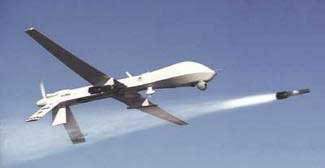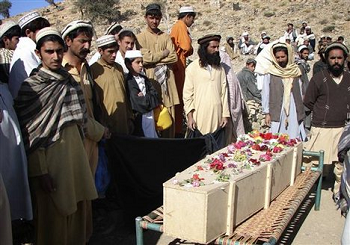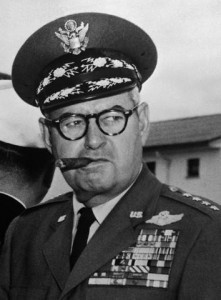date newest »
newest »
 newest »
newest »
 Hi Quentin—
Hi Quentin—Certainly no pain should be caused by disagreement! I’m always up for a good argument—especially when it’s on issues about which I feel strongly (and with people whom I respect as much as I do you).
The points you bring up are all ones that I’ve considered and discussed (most recently, actually, with the NYT op-ed editors, for whom I originally wrote and then revised this piece, though in the end they didn’t use it). As I note above, drones are obviously less deadly than full-scale invasions or firebombings, and there is no doubt that given an choice between 100,000 collateral deaths and 1,000 the lower number is better. Moreover, I’m not making a blanket argument against state-managed violence. There are unquestionably times when we are morally obligated to go to war. Germany invades Poland; we should stop them. Japan invades pretty much all of East and Southeast Asia—ditto. Both are solid, ethical reasons to take up arms as a last resort. And when we do, one tragic but unavoidable consequence is that innocent people will die along with the guilty.
But what we are doing with the drone program (and by “we” I of course mean George Bush, Barak Obama and a few men in the CIA and the Defense Department) is a different thing altogether. It isn’t last resort. In fact, it can’t even be defined properly as “war” since we haven’t officially declared one on anyone. Instead, we have a secretive and unexplained list of supposed “enemies” (or in your words a “few key people who steer ideologies and terror”) whom are accused, tried and sentenced without any accountable review system and often without any demonstrable criteria. Indeed, as William Daley--Obama’s own chief of staff in 2011--has observed: “One guy gets knocked off, and the guy’s driver, who’s No. 21, becomes 20?...At what point are you just filling the bucket with numbers?” Sorry. This isn’t war. This is exactly what you yourself call it: assassination—and to my mind there is little (if anything) honorable or moral about it.
But perhaps a more important argument relates to the value of life itself. There is a tractate in the Talmud stating that whomever saves a life it is as if they are preserving the whole world, and he who destroys a single soul it is as if they are guilty of destroying a whole world. I believe that that’s an important moral line we often miss in the fever of war (or whatever it is that we now find ourselves in); when we begin to pat ourselves on the back and define the blowing up of fewer women and children as "compassion." Here's the thing: a single life matters. And when we excuse the loss of any civilian life as a “necessary” casualty of war we start on a very dangerous path. This, I think, is the central peril of the so-called “War on Terror:” a slow and steady moral degradation that now finds people like you—good, deeply moral people—essentially excusing the bombing of children.
Finally: I believe that the growing undercurrent of outrage over the legal vagaries of these attacks and the callous and incidental carnage that accompanies them is not solely the product of journalistic technology, though the latter does indeed allow us to put a more human face on the tragedies (a poignant example of this appears at https://www.commondreams.org/view/201..., the same piece from which the Daley quote is drawn, which also shows the lifeless faces of ten Afghan children “we” killed on April 7th). It has more to do with the fact that more people are coming to realize that a lower civilian death count alone doesn't absolve us of moral responsibility. To argue that it does is to argue that the ethics of civilian killing boil down to simple scale: kill too many innocents, and it’s a bad thing. But if we keep the numbers “reasonable”—well, then we’re off the hook. Frankly, I have a hard time seeing how anyone can justify that position and still face themselves in the mirror in the morning. But as the rising number of civilian casualties sadly gives proof to, apparently some people can.
 Actually, Germany invaded Poland and we didn't do anything about it. Japan invaded Southeast Asia, and we went to war because they attacked Pearl Harbor. Not because we were coming to anyone's rescue.
Actually, Germany invaded Poland and we didn't do anything about it. Japan invaded Southeast Asia, and we went to war because they attacked Pearl Harbor. Not because we were coming to anyone's rescue. Moral abomination is rarely a reason anyone has gone to war - if it was, you'd surely be pressing us to invade North Korea - check out "Escape From Camp 14" for one of last year's truly bizarre reads.
The Talmud line is very appropriate for individuals, but it holds true for few examples of state-managed violence.
Away from that: I fear you haven't read my post clearly. I said that all war is a form of assassination - for some reason people are upset at this one because it is impersonal killing from a distance, and not the kind of killing where cities are devastated and economies destroyed.
That was Industrial-Age large-scale assassination - sorry, war - which arose with Bonarparte, and stopped yielding effective results for great powers soon after World War II. Gen. Rupert Smith's "The Utility of Force" is very good on this.
As we moved out of the industrial age, the characteristics of war changed too - holding physical assets was generally less meaningful, both sides fought to control the media story as much as the actual story, the irregular opponents were characterized by fast-acting improvization.
These are all hallmarks of what we now call the Information Age, and our warfare is changing to suit the times. I wrote a piece about this awhile back, concerning the 2012 Pentagon budget: http://bits.blogs.nytimes.com/2012/01...
Many like you find the new hub (intelligence gathering and policy making) and spoke (execution) model of killing somehow worse, to a point where you make it the equivalent of Tokyo or Dresden.
Why should this be, when it actually has a far smaller loss of life, and overall damage compared with the earlier wars, including the war against al Queda in Afghanistan?
Is it wrong because it is anonymous? Because the killer takes no physical risk? Because it is easy? These questions raise the prospect that we only approve of killing when it meets certain atavistic standards.
If we were dispatching SEAL teams instead of drones to do these assasinations, and they were killing people in that conventional "collateral damage" way, would that somehow be better?
Lastly, I underline a point I made in the earlier comment. Living in the Information Age, every death comes with a biography, and that seems to lead to far less loss of life than we've seen in the past - or today, when the killing in a situation like the wars of Africa, or North Korea's violence to its own people, is still anonymous. I think it is why, in Iraq, the Pentagon actually refused to count civilian deaths.
This is one of the most profound and estimable changes in our time, and is likely to have a more profound impact over time. I'm surprised people don't comment on it more.
 Quentin wrote: "Actually, Germany invaded Poland and we didn't do anything about it. Japan invaded Southeast Asia, and we went to war because they attacked Pearl Harbor. Not because we were coming to anyone's resc..."
Quentin wrote: "Actually, Germany invaded Poland and we didn't do anything about it. Japan invaded Southeast Asia, and we went to war because they attacked Pearl Harbor. Not because we were coming to anyone's resc..."Fair point on Germany and Pearl Harbor--though others did go to war against Germany before us and were (of course) morally obligated to do so. And even though we held out until Pearl, we did ultimately go to war to censure Japanese aggression in Asia.
As for your point about the Talmudic line--part of what I would argue is that while it may not "hold true" for state-managed violence, I think it should. We may be inflicting fewer civilian deaths in Afghanistan and Pakistan than we did in Germany and Japan (or Vietnam, for that matter). But we still excuse them in the same way-as "necessary" in the name of a greater cause. Which is still a problem for me. Because once you excuse the death of a single innocent as "necessary" you essentially are excusing countless deaths. You're excusing the act itself. It's an issue of morality, not scale.
As I mentioned in my earlier post, I also have a hard time defining what we are doing in Afghanistan and Pakistan as "war"--particularly since up until very recently no one would even admit we were doing it. For me, "going to war" implies some clearly-defined transgression on the part of those we go to war against, clear evidence of imminent danger posed by the enemy, and some sort of agreed-upon resolution and accountability system--not to mention an ethical code like the Geneva Conventions.
What we are doing in Afghanistan and Pakistan is picking "likely" combatants--oftentimes based on information provided by nationals who may well have their own personal axes to grind--and summarily executing them. Along with anyone who happens to be around them. In part, we are doing this because it causes less legal fuss and outcry for us than trying to capture these men alive. Whether it's drone operators in Montana or SEAL teams on the ground in Al Majalah it still crosses ethical lines that I'm not at all comfortable with. Though I do agree that it represents a seismic shift from past ways, and that the relative lack of discussion about it is surprising....










If your issue is with state-managed violence, then your issue is timeless. This is what nations do. And, pace Hobbes, it's better than the alternative. All war is a form of assassination; we fought World War II, with its 50 million deaths, essentially to kill one man in a bunker in Berlin. To succeed in this mission, we entered a period of "total war" to do it, razing cities in the interest of an assassination.
The media's effect on war has been going on for awhile, and it has been both beneficial and frustrating. It humanized the U.S. losses in Vietnam, and pointed out the absurdity of an unwinnable war.
But it has also led to a kind of absurdity in international relations and warmaking (dislike that term all you want, it is what great powers have always done, and likely will.) It is best seen when Bill Clinton pulled U.S. troops out of Somalia when one of his soldiers was filmed being dragged behind a truck, or when three U.S. mercenaries were hanged and burned in Falujah, and hundreds of Marine lives were lost in a gesture of little strategic value.
We are now assassinating more precisely, as befits an information-era war where the goal is not the command of geography but the elimination of a few key people who steer ideologies and terror. So far, our collateral damage is far below anything we've seen in centuries, since the advent of widespread industrial-era war.
What is interesting is that, this being the information age, we annotate and bring a biography to each death - so the losses in the drone strikes seem so horrid. We have turned on its head Stalin's crazy wisdom that "the death of one person is a tragedy; the death of a million is History," for we can now see each of those million with a richness that before required the most active imagination.
But as great an advance in our humanitarian feelings is, it also risks becoming a kind of failure of the imagination as regards the past. Attach the same level of biographic compassion to those killed in Desert Storm, Vietnam's Christmas bombings, the 5 million killed in Congo since 1998, or the residents of Tokyo, Dresden, or the 40,000 dead in the London Blitz in World War II, as ou do to the inadvertent victims of our distant, passionless drones, and you will see what I mean.
My point is, we are in general (though Congo and other parts of Africa give this idea the lie) vastly more respectful and compassionate over human life than ever in the 20th C. For that matter, total U.S. deaths in the Iraq and Afghan wars since 2001 are about 6500. That is somewhat more than half the number killed in three days at the battle of Cold Harbor during the Civil War.
As I said, the Iraqi casualties alone are much higher, but that is due to high-altitude weapons, not drones. And the Pentagon's refusal to even count them shows a generally positive trend in the way we think about deaths in wartime. That is one of the reason we are now so reliant on drones - they kill fewer people.
Were those deaths, now far in the past, felt less acutely by their contemporary loved ones? I think not. What is different is that we all feel them more now, we have them reported immediately, often with detailed personal histories, and thus are more outraged by each death we see, thanks to the more complete reporting our technology allows.
Yay that; Absent nuclear conflict, slaughter wars are less likely in the future.
But it must also be seen that our compassion for the present exposes our callousness about the past.
Yes, drone strikes are not as clean as our overlords would like us to think. But they are not the moral abomination you make them out to be in this post, given History's alternatives.